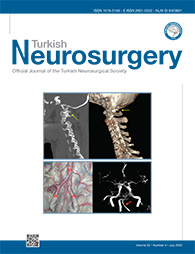2The George Washington University School of Medicine and Health Sciences, Washington, DC, United States
3The George Washington University Hospital, Department of Surgery, Washington, DC, United States DOI : 10.5137/1019-5149.JTN.35843-21.3 AIM: To compare the perioperative outcomes between single-day combined or separate-day staged surgeries for cervical spinal stenosis.
MATERIAL and METHODS: A retrospective cohort analysis was conducted on consecutive patients admitted at a single institution between July 2015 and April 2019, who underwent either single-day combined or separate-day staged surgeries during the same hospitalization period. Demographics, comorbidities, hospital length of stay, and perioperative complications were compared between the patient groups.
RESULTS: Eighty patients (combined surgery: n=68, staged surgery: n=12) were included. Dysphagia was the most commonly reported postoperative complication in 44/80 patients (55%). There were no significant differences in the baseline demographics between the two groups. The staged surgery group had significantly longer total time in the operating room (7.2 vs. 8.5 hours, p=0.002), longer duration of general anesthesia (6.7 vs. 7.6 hours, p=0.006), and higher incidence of postoperative delirium (12.1% vs. 50% p=0.005) than the combined surgery group. The mean hospital length of stay was similar in the two groups (combined surgery: 7.5 days vs. staged surgery: 15.1 days, p=0.09).
CONCLUSION: Staged anterior and posterior cervical decompressions, stabilizations, and fusions are associated with longer total time in the operating room, longer duration of general anesthesia, and higher incidence of postoperative delirium than combined surgeries.
Keywords : Cervical spine, Combined spine surgery, Staged spine surgery, Postoperative complications




